|
|
|
Sort Order |
|
|
|
Items / Page
|
|
|
|
|
|
|
| Srl | Item |
| 1 |
ID:
159847
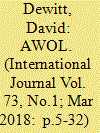

|
|
|
|
|
| Summary/Abstract |
Our focus is on Canadian defence and security activities in the Asia Pacific arena between 1990 and 2015. While governments have asserted the growing primacy of the Asia Pacific, we ask the following: What does Canada’s recent military and security record tell us about the policies and operational aspects of Canadian engagement? How might we assess these in comparison with Ottawa’s declared importance of the Asia Pacific? What might this tell us about the near-term future of Canada’s role and pursuit of interests and opportunities in this complex region? We present and analyze empirical materials drawn from primary sources that inform an assessment of Canada’s presence in the defence and security agenda of the Asia Pacific, during the period that saw Canadian governments declare a deep interest in relations with the Asia Pacific, yet fail to make Canada a full partner with sustained commitments.
|
|
|
|
|
|
|
|
|
|
|
|
|
|
|
|
| 2 |
ID:
159852
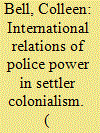

|
|
|
|
|
| Summary/Abstract |
In contrast to narratives by the Royal Canadian Mounted Police, the United Nations, and some scholars that international police assistance is a relatively recent phenomenon, we argue that Canada's Mounties have always been international. To develop this argument, we examine three dimensions of police power in international relations historically and with respect to the role of the Mounties specifically. First, we discuss the concept of police power and its central role in giving rise to another concept: civilization. The concept of civilization gained considerable traction as a rationale for police power in Britain's colonies, including Canada. Second, we turn to a discussion of imperial policing in the colonial settlement of Canada involving an elaborate array of “civilizing” techniques, some of which are still in operation today. Since Confederation, the Mounties have been involved in wide-ranging state-building missions with the purpose of securing Canadian sovereignty, in part through land and resource acquisition, and the denial of Indigenous sovereignties. Third, we show that the Mounties' contributions to settler colonialism played a role in shaping international relations from the twentieth century. In particular, the Mounties were central in constituting Canada as a member of the globally dominant Anglo-Saxon community of states. In conclusion, we suggest that current international policing practices in the global periphery are not novel phenomena, but are rooted in international police powers that made possible the colonial settlement of Canada.
|
|
|
|
|
|
|
|
|
|
|
|
|
|
|
|
| 3 |
ID:
159849


|
|
|
|
|
| Summary/Abstract |
Based on primary and secondary sources, this article analyzes the policy of the Mulroney government on humanitarian intervention in the former Yugoslavia between 1991 and 1993. It finds that the Mulroney government chose to play a leading role in the international intervention in the former Yugoslavia, because doing so both allowed the government to implement its vision of a post-Cold War world order that aligned with its understanding of Canadian interests, and satisfied the demands and preferences of the Canadian public. At the same time, the Mulroney government stumbled into unanticipated situations in Yugoslavia, and failed to respond to them effectively. This led the government to reconsider the assumptions that had motivated its initial enthusiasm for intervention, and to commence a review of peacekeeping and intervention that it would not live to implement.
|
|
|
|
|
|
|
|
|
|
|
|
|
|
|
|
| 4 |
ID:
159855
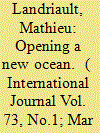

|
|
|
|
|
| Summary/Abstract |
This policy brief focuses on the opening of the Central Arctic Ocean and the subsequent questions this poses to regional governance. This change has the potential to radically alter the nature of Arctic governance as non-Arctic states will have to play a significant role in the rules that will apply in the Arctic high seas. Talks about a regional fisheries regime will define the future of this region. The creation of a coordinating agreement would have the benefit of not challenging Arctic states too fundamentally while at the same time incorporating non-Arctic states in a meaningful way in the regional governance infrastructure.
|
|
|
|
|
|
|
|
|
|
|
|
|
|
|
|
| 5 |
ID:
159853


|
|
|
|
|
| Summary/Abstract |
Within the literature on human rights, the 1970s are often viewed as a period in which rights achieved a breakthrough globally. While rights regimes, activist networks, and the overall discourse of human rights certainly came into their own during this decade, the rights revolution had its limitations, particularly at the international level. In the Canadian context, the government of Pierre Trudeau advanced a domestic rights program, culminating in the Charter of Rights and Freedoms. In terms of foreign policy, however, Trudeau was far more cautious. Tracing Pierre Trudeau’s stance toward international human rights, this article points to the prime minister’s realist outlook as having delimited the place of rights in Canadian foreign policy during his time in office. Thus, there was little enthusiasm on the part of the Canadian government to support self-determination movements, to impose bilateral sanctions against abhorrent regimes, or to loudly condemn rights violators when doing so would seemingly accomplish little. The point of this paper is not to condemn Trudeau, but rather to understand why Canada’s rights revolution stopped at the water’s edge.
|
|
|
|
|
|
|
|
|
|
|
|
|
|
|
|
| 6 |
ID:
159851


|
|
|
|
|
| Summary/Abstract |
This article examines how Canadian Liberals understood Canada’s international relations in the late nineteenth and early twentieth centuries, situating their political thought within the British imperial world and their views of the Great War in a broader historical context. It argues that while Liberals regarded Canadian participation in the war as an affirmation of nationhood, they nonetheless conceived of Canada as a “British nation” and an integral part of a British imperial community in international politics. The article further illuminates the growth of an autonomous Canadian foreign policy within the British Empire, and shows that even the staunchest Liberal proponents of independence upheld the Dominion’s British connection. In so doing, it connects the history of Canadian Liberalism to a wider British Liberal tradition that advocated the transformation of the relationship between the United Kingdom and its settler Dominions from one of imperial dependence to that of equal, sovereign, and freely associated nations.
|
|
|
|
|
|
|
|
|
|
|
|
|
|
|
|
| 7 |
ID:
159848


|
|
|
|
|
| Summary/Abstract |
This paper challenges a mainstream view in ASEAN literature that ASEAN-level institutions constrain the spread of global liberal policies. It rather shows that ASEAN elites’ collective diplomatic practices have facilitated the spread of these policies by making ASEAN a lively “transfer platform” that external liberal countries can use to actively teach and study liberal policies and ideas. First, ASEAN’s methods for engaging external partners have allowed the promoting countries to earn recognition as reliable and competent partners committed to ASEAN concerns by institutionalizing the organizational bases for sustainable interactions with ASEAN stakeholders. Second, elites’ constant pledges of ambitious plans for regional integration have had positive effects in terms of lowering political costs of the promotion activities by the external partners because these activities were framed as responses to ASEAN’s voluntary turn towards liberalism. Third, thanks to ASEAN’s “let’s gather and talk” practices, the promoting countries can take advantage of ASEAN as a useful venue for expanding pan-ASEAN coalitions that can eventually become local allies supporting liberal reforms of their countries.
|
|
|
|
|
|
|
|
|
|
|
|
|
|
|
|
| 8 |
ID:
159850
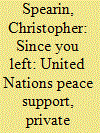

|
|
|
|
|
| Summary/Abstract |
In the late 1990s when Canada was largely removing itself from United Nations peace support endeavours, private military and security companies were heralded as likely replacements. Canada has indicated its desire to reengage in a United Nations peace support milieu in which there is now a private military and security presence. It is not the type of presence initially envisioned, but it is one with multiple impacts regarding training and operations. This article emphasizes the interventions in the first decade of the twenty-first century and the corresponding, defensively minded regulations that came about in the private military and security industry. The article reveals that commercial logics are now insinuated in United Nations peace support operations and the private military and security presence therein is indicative of a larger shift in United Nations activities towards insularity and protection.
|
|
|
|
|
|
|
|
|
|
|
|
|
|
|
|
| 9 |
ID:
159854
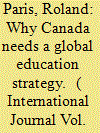

|
|
|
|
|
| Summary/Abstract |
Based on the report of the Study Group on Global Education, this article explains why Canada needs a national strategy aimed at significantly increasing the number of Canadian post-secondary students going abroad for study and work-integrated learning experiences. International education may once have been viewed as an optional luxury. Now it must be seen as a vital tool to equip young Canadians – and Canada – to succeed in a more complex and competitive world.
|
|
|
|
|
|
|
|
|
|
|
|
|
|
|
|
|
|
|
|
|